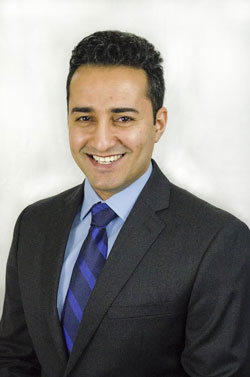December 15, 2015

The fifth of nine children, who grew up in the city of Khorramabad in mountainous western Iran, Mostafa Papi already had significant learning, teaching, and academic experience in Iran when he applied and was accepted as a doctoral candidate in the Second Language Studies (SLS) Program at Michigan State University.
In Iran, Mostafa received a BA in Teaching English Language and Literature from Sabzevar Teacher Training University in 2006, and taught EFL courses at the Iranian ministry of education, Lorestan University, and some private institutes.
He then earned an MA in Teaching English as a Foreign Language (TEFL) from Iran University of Science and Technology in 2009. During his master’s degree, he started conducting large-scale research studies and published in top-tier journals in the field of Applied Linguistics, which made him an ideal candidate for the doctoral programs in the US.
“I came to MSU from Iran in 2011,” Papi says. “MSU has one of the best programs in the country, so I applied to its PhD program along with a few other universities, and received multiple offers. But, MSU was particularly helpful, largely because of SLS PhD program chair (and University Distinguished Professor) Dr. Susan Gass, who was very, very supportive, handling a lot of problems for me, and making it possible for me to come over to the land of Spartans!”
Mostafa believes that his transition to the new context was challenging, though.
“And by my second year, just as I was getting adjusted to the new culture, there was an even bigger adjustment when I began teaching undergrads at MSU.”
But Papi says that he accepted the challenge and worked hard on it. Over two semesters of teaching at MSU, he says he made a transformation in his teaching, becoming more comfortable, and receiving the highest ratings from his students and supervisor.
Papi is grateful for the financial support he received at MSU. “Without the funding I received from the department, I would not have even thought about coming to the U.S.,” Papi says. “To come and get an education here is impossible for someone like me from a middle class Iranian family, if I didn’t have the financial support.”
Papi’s father ran a carpet store until he passed away two years ago, and his mother, who had been a housewife, now runs the store even though it is not common for women to run such a business in Iran. Remarkably, all eight of Mostafa’s siblings—six sisters and two brothers, all of whom still live in Iran—have university degrees including bachelor’s, master’s and PhD degrees in different fields of study, despite both their parents not receiving any education.
Mostafa believes that he and his siblings owe their success to their kind, hardworking, and supportive parents. “My parents didn’t have any education,” Papi says, “but they had a vision for us; they believed in and generously supported us. That is enough for some people to pursue big goals in life.”
Today, Papi is a PhD student at MSU living and working as a visiting assistant professor at Mississippi State University in Starkville, MS. Previously, Mostafa successfully taught Language, Learning & Technology (LLT) courses to undergraduate students in MSU’s College of Arts & Letters for three years to fulfill his assistantship duties.
The transition to Mississippi State has been a change, Papi says, but did not require such a big adjustment as the one he had before (“both school’s initials are MSU”), even though he believes that there are clear differences between the two cultures.
Mostafa says that he had decided while in Iran that he wanted to make his career in academia, in large part because he loves teaching and had always gravitated toward research. Papi has published in major professional journals in the field of Applied Linguistics including Language Learning, System, International Journal of Applied Linguistics, and TESOL Quarterly.
His research focus is on how motivation and personality could influence the learning processes and outcomes involved in second language acquisition, and how to improve second language pedagogy through motivational teaching.
“Task-based language learning is one of the areas that I want to improve,” Mostafa says. “We believe that language classrooms should be as close to real life situations as possible. So, we design tasks that simulate real-life situations to give learners the opportunity to meaningfully practice their language and communication skills.
“Our field is a very young field. Some areas are underdeveloped, especially the motivational aspects of second language learning. By introducing theories from other fields of study, be it social, educational or consumer psychology, I hope to see how we can make an impact and make language teaching more effective.”
Concerning his experience at MSU, Papi says, “Coming to Michigan State University was a very, very positive experience for me. It was an experience I could not have gained anywhere else. MSU is an institution with such an inclusive, diverse, and supportive academic community, where you can work hard, learn, and achieve.”
“Dr. Susan Gass and all the professors in our department at MSU were very supportive,” Mostafa says. “More specifically, Dr. Winke, Dr. Polio, and Dr. Hardison (who was my teaching supervisor) gave me a lot of confidence and great feedback both in my studies and teaching. I’ve always been interested to know what others thought of my work, and those experiences helped me a lot to become the teacher and researcher I am, today.”


